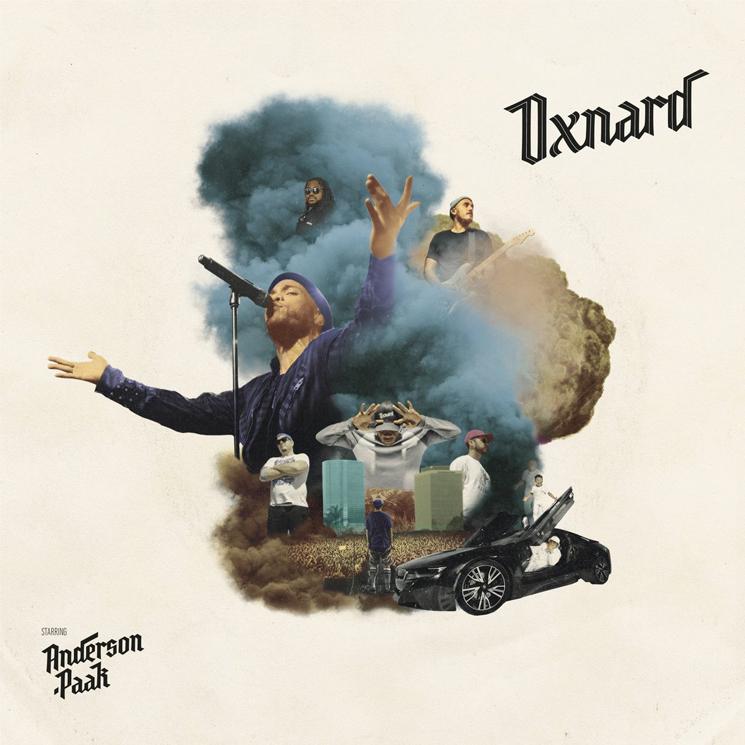Anderson Paak’s raspy voice shifts from soulful crooning to freewheeling rapping with incredible ease. With an instrumental palette built around funky basslines and also featuring distinct influences from jazz, soul and hip-hop, Paak’s third solo album, “Oxnard,” sees the artist paint nostalgic pictures of hedonistic California summers. Paak’s genre-bending sound continues to develop, but lyrical shortcomings overshadow the album’s otherwise compelling sonics.
“These are lessons you learn with no tuition,” Paak raps on the opening track, “The Chase.” It’s a lyric that captures the energy which underscores most of the album’s content. Tracks like “Headlow” and “Saviers Road” are narratives that see Paak relay his (presumably) lived experiences. Mostly, these experiences involve selling drugs and having sex — an excess of the latter is the album’s most glaring flaw.
Paak’s two prior full-length solo releases, 2014’s “Venice” and 2016’s “Malibu,” both dealt with some of the same subject matter as “Oxnard.” While presenting as a “ladies’ man” is not new for Paak’s listeners, some of the more overtly sexual moments on the new release seem to step out of the realm of free love and more into an arena of outright lewdness. For example, the ham-fisted “Headlow” shares one such encounter — rather than being clever or interesting, the vivid detail Paak inserts into the lyrics results in a sleazy, completely unnecessary piece of braggadocio.
“Sweet Chick” (featuring BJ the Chicago Kid) is yet another song where Paak’s brazen sexuality falls flat over the track. The glossy, anthemic production features gospel-esque background vocals. It is uplifting, soulful, and does absolutely nothing to redeem the fact that the song is entirely built around both artists describing literally a dozen women they’ve had sex with. By the time it ends, the track’s poorly-construed sexuality has done nothing but exhaust the listener.
At some points, Paak’s confidence is able to shine through in a way that is genuinely likable. On “Who R U?” and the Dr. Dre and Cocoa Sarai-featuring “Mansa Musa,” groovy basslines accompany Paak’s hyperactive rapping. The lyrics center on being materially wealthy, which Paak executes without any of the awkward oversharing that is found on some of the album’s other songs. On “Mansa Musa,” he boasts, “I double my wins, now look how my whole team shine / Hell no, blow out my dough, I’m tryna keep mine.” The cash-centric lyrics and energetic beats pleasantly call back to “Bubblin,” a single released earlier this year that unfortunately didn’t make the album. Nevertheless, fans of “Bubblin” are sure to enjoy the dizzying flows that are scattered throughout “Oxnard.”
The Kendrick Lamar-featuring lead single, “Tints,” is another incredibly fun listen. Sunny synths underscore Paak’s bright vocals, and the song’s summery feel that echoes “Malibu.” It’s a catchy cut and its placement right before “Who R U?” showcases Paak’s versatility as an artist. One of the best parts of “Oxnard” is that the genre-bending Paak is known for really shines through — “Tints” combines pop, R&B and hip-hop into a song that is unique and engaging without playing into the tropes that a lot of music which exists at that intersection is known for.
“Anywhere” is the nostalgic counterpart to “Tints,” but lacks any of its counterpart’s pep. Featuring the laid-back California rap icon, Snoop Dogg, as well as The Last Artful, Dodgr, the track ends up being too chill. The mellow vocal contributions from all three performers and the soft funk instrumental do little to propel the track forward. It’s one of the sleepiest cuts in the tracklist but is, fortunately, one of the only misfires when it comes to the actual sound of the project. For the most part, the groovy production and Paak’s vocal performances keep most of the album engaging from a sonic standpoint.
If “Oxnard” more consistently featured the bright energy of “Tints” or the self-sure swagger of “Mansa Musa,” Paak would undoubtedly have a career standout. From a vocal standpoint, he’s never sounded better and the production positively bolsters the album’s Cali aesthetic. For fans of Paak’s music, there are certainly plenty of enjoyable moments on “Oxnard.” The album’s highlights, though, sound better in playlists than they do on the tracklist — compared to his other work, “Oxnard” just doesn’t stack up.
_Edited by Siena DeBolt | [email protected]_








